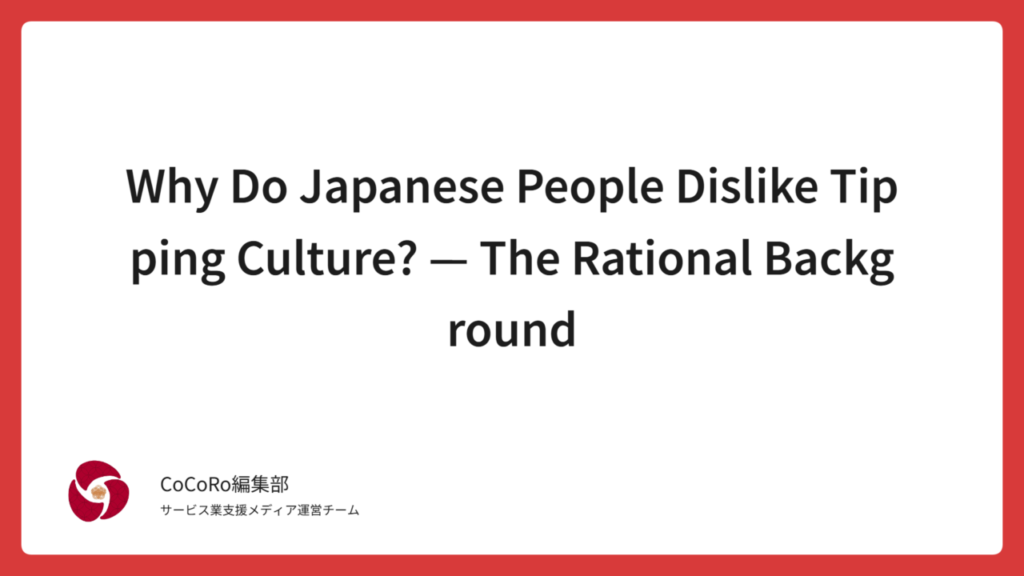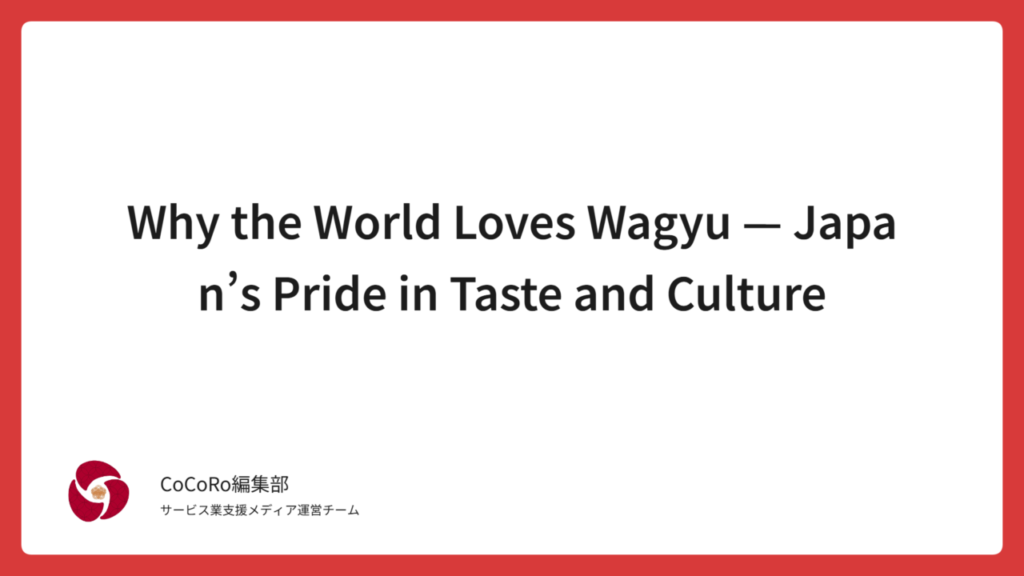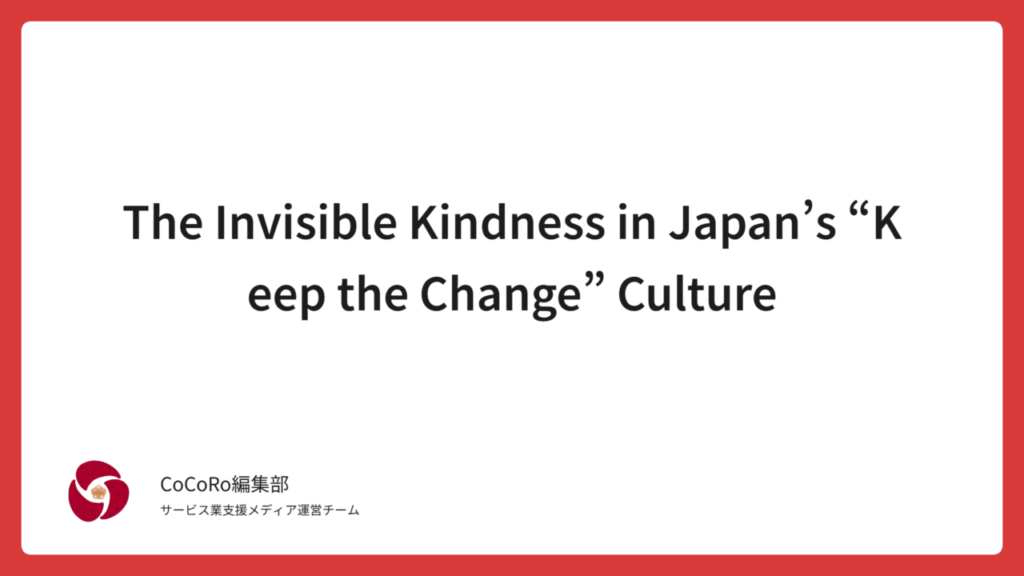
- 1. Introduction — The Japanese Sense of Discomfort with Tipping Culture
- 2. The Contradictions of Western Tipping Practices
- 3. Rational Reasons Why Japanese People Dislike Tipping
- 4. Tipping-Like Practices in Japanese Society
- 5. Why Is Tipping Disliked Even Though It Represents the Same “Gratitude”?
- 6. Conclusion — Why Japanese People Rationally Dislike Tipping
1. Introduction — The Japanese Sense of Discomfort with Tipping Culture
When traveling abroad and dining at a restaurant, many Japanese people experience a moment of confusion: tipping. In Europe and the United States, this practice is deeply rooted as a way to show gratitude for service. Yet for Japanese people, tipping often feels uncomfortable. “If it’s an expression of thanks, why does it feel like an obligation?” or “Shouldn’t it simply be included in the price?” Such questions are not born from cultural ignorance. Rather, the negative perception of tipping in Japan stems from rational reasons behind it.
2. The Contradictions of Western Tipping Practices
Tipping was originally meant to be a visible form of gratitude — a small token given to those who provided a service. However, in practice across Western countries, this role has been greatly distorted. Today, tipping often functions as a system of wage supplementation, forcing it to cover what should be guaranteed by employers.
Many restaurant workers in the United States are hired at base wages below the legal minimum, with tipping assumed as part of their livelihood. In this system, tips are not an expression of gratitude but rather a form of income — closer to a necessity than a thank-you. As a result, customers also carry the psychological burden of feeling that they must pay, rather than choosing to give freely.
This shows the contradiction that occurs when a spontaneous act of gratitude is absorbed into the system, transforming it from a genuine emotion into a social obligation.
3. Rational Reasons Why Japanese People Dislike Tipping
3-1. Trust in Transparent Pricing
In Japan, restaurants and hotels generally operate with all-inclusive pricing, meaning tax and service charges are already included. Customers enjoy the peace of mind that comes from knowing exactly how much they need to pay. When asked to add a tip on top of this, it naturally creates distrust — “Why should I pay twice for the same service?”
3-2. Concerns About the Wage System
Once people understand that tipping in Western countries often functions as wage supplementation, it becomes natural for Japanese to reject it. If such a system were introduced in Japan, companies might use it as an excuse to lower base salaries, arguing that tips will make up the difference. At the core of Japanese concerns lies the fear that widespread tipping could ultimately reduce overall working conditions for employees.
3-3. The Discomfort of “Forced Gratitude”
Japanese people place great importance on expressing gratitude. However, it must remain a voluntary act, not something enforced by a system. The moment “thank you” becomes mandatory, it ceases to be gratitude and turns into a burden. This psychological resistance lies at the very core of why Japanese people dislike tipping.
4. Tipping-Like Practices in Japanese Society
That said, Japan is not entirely without a culture of gratuities. In fact, Japan has developed its own unique practices of making gratitude visible in everyday life.
- In the world of Japanese performing arts, the tradition of ohineri — cash tips given to performers — has long existed.
- In Japanese bar culture, there is a refined custom of showing appreciation by buying the bartender a drink.
- In street performances and live video streaming, the practice of nage-sen — virtual tipping or small cash contributions — has become increasingly common.
What all of these practices have in common is that they are not forced. The receiver simply accepts a “thank you,” while the giver expresses one. This genuine exchange of gratitude is socially accepted and has become rooted in Japanese culture.
5. Why Is Tipping Disliked Even Though It Represents the Same “Gratitude”?
Even when it represents the same expression of gratitude, Japanese people view practices like ohineri or nage-sen positively, while tipping feels uncomfortable. The difference lies in two key factors: its voluntary nature versus its institutionalization.
Ohineri and nage-sen come directly from the giver’s heart. Whether to give or not is entirely up to the individual, and there is no sense of obligation. Tipping, on the other hand, is assumed to be mandatory, and the moment it becomes institutionalized, its voluntary nature disappears.
Japanese people are highly sensitive to the feeling of being forced by a system. In a society that places strong value on financial transparency, “forced gratitude” is perceived as insincere. This is the decisive reason why tipping is disliked in Japan.
6. Conclusion — Why Japanese People Rationally Dislike Tipping
Japanese people dislike tipping not simply because of cultural differences, but because the institutionalized “wage-supplement tipping” system in Western countries has drifted far from its original purpose of making gratitude visible.
Japanese people intuitively recognize this contradiction. This is precisely why they show strong resistance to the transplantation of tipping culture into Japan.
However, this does not mean that the idea of making gratitude visible is entirely rejected. On the contrary, Japanese society has long fostered many traditions of expressing appreciation voluntarily. If tipping were redesigned not as wage supplementation but as a voluntary expression of gratitude, it could very well be accepted in Japan.
If such a system functions effectively, it can enhance the motivation of service staff and lead to better customer experiences. In other words, this “cycle of gratitude” could become a driving force for raising service quality to an even higher level.






